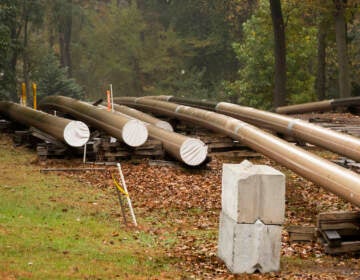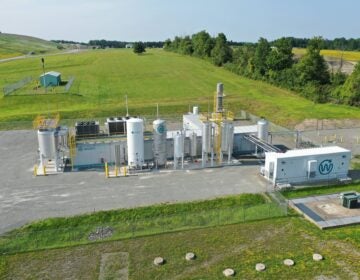China cutback on taking recyclables means more to burn in Chester City
Chester residents have been dealing with the health effects of trash incineration in their community, and an influx of plastic waste has reignited the debate.

Sorting through recycling (John Mussoni/WHYY)
China’s decision to significantly reduce the amount of plastic recyclables it accepts from the U.S. has hurt communities across the country. Previously, the U.S. sent unsorted loads to China where workers separated contaminated plastics before processing.
With the change in protocol, American municipalities are scrambling to deal with all the recyclable material they can no longer export.
On a recent edition of WHYY’s “Radio Times with Marty Moss-Coane,” environmental engineering expert Jenna Jambeck explained, “We estimate globally that there will be 111 million metric tons displaced by this policy.”
“It’s staying in the U.S., and it’s either being stockpiled … in some cases, some facilities have decided to try to start processing it themselves,” said the University of Georgia professor. “In other cases, they’re just disposing of it.”
In Pennsylvania, much of the excess plastic is going to a trash incinerator in Chester City, Pennsylvania.
Chester resident and environmental activist Zulene Mayfield, who has long opposed the trash incinerator, was also on the show to discuss what it’s like living next door to the plant.
“Chester is like every other community. It’s my home, and everyone wants the best thing for their homes,” she said. Acknowledging a number of different pollution sources, Mayfield said, “We find that the incinerator is probably the biggest assault on our lives.”
Many in the community blame the incinerator emissions for poor health, and the facility has been under scrutiny.
Dr. Marilyn Howarth of the University of Pennsylvania discussed specific ways pollution has harmed Chester residents.
“The latest data on asthma is 23 percent [in Chester]. The national rate for asthma in children is 8 percent,” she said. “So 23 percent is really quite high.”
“Everybody is walking around with inhalers,” added Mayfield.
Waste management company Covanta, which operates trash incinerators all over the country, runs the Chester plant. Covanta senior vice president Paul Gilman, who also appeared on the show, attempted to address Mayfield’s concerns about his company’s impact on the city.
“We’ve continued to improve the levels of emissions and reduce them even further. And this is in a context, too, of not having anything that we do there to be disruptive of the community,” Gilman said. “So we are constantly trying to find ways, collaborating with the community, to do it in a more integrated way.”
“We want you to be better at what you do,” responded Mayfield, who suggested adding more pollution-control devices to the facility.
Covanta has maintained that its plant emissions are within the limits mandated by Pennsylvania Department of Health permits.
Howarth agreed, but she said the standards for emissions permits are problematic in the first place.
“It’s not good enough,” she said. “And I think the health statistics that show the disparities in Chester are really the evidence for that.”
But whether the issue is emissions standards, community engagement, or the practice of burning trash, Chester residents continue to feel slighted and under assault by the Covanta plant in their neighborhood.
“This is a survival for our lives. This is a fight because we believe we’re worth fighting for,” Mayfield said. “This is a community that we love. And it’s our home. And we should have more of a say than any bottom line, any trucker, any incinerator, anything. We were there before they were there — and we’re going to be there after they shut down.”
WHYY is your source for fact-based, in-depth journalism and information. As a nonprofit organization, we rely on financial support from readers like you. Please give today.





